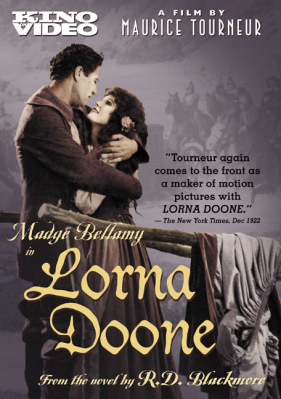Lorna Doone (DVD)
Lorna Doone was filmed three times before in the silent era, and six times more in the sound era, but the 1922 production directed by Maurice Tourneur is arguably one of the finest, and without a doubt the most beautiful. Like most of the feature adaptations of Lorna Doone, the 1922 version allows the romance and action of the novel to exist largely untouched by the tumult of the English Civil War. A young girl of noble birth is kidnapped by the Doones, a feared band of theives and cutthroats. Their leader, fallen nobleman Sir Ensor Doone, raises the girl, Lorna, as one of his own kin. Lorna secretly falls in love with yeoman John Ridd, but must contend with the brutish Carver Doone, who wants Lorna for his own.
In Lorna Doone, Tourneur uses natural lighting and the landscape to frame his actors with painterly effect, showcasing a very different set of aesthetic values than those of The Blue Bird, with its elaborate stylized sets and costumes. Both are representative gems of his silent work, much of which remains lost.
This edition of Lorna Doone was transferred from an original print at 18 fps and features a new score for piano and strings by Japanese singer/songwriter and composer Mari Iijima.
USA 1922 Color-tinted 87 min. Full-frame
Directed by Maurice Tourneur
Produced by Thomas Ince
Adapted for the screen by Katherine S. Reed,
Cecil G. Mumford, and Wyndham Gittens
from the novel by R. D. Blackmore
Photographed by Henry Sharp
Costumes and Art Direction by Milton Menasco
With Madge Bellamy, John Bowers, Frank Keenan, Mae Giraci, Charles Hatton
Score Composed and Arranged by Mari Iijima
Produced for Video by Jesse Pierce
Special Contents of This Edition
2001 Jesse Pierce
- Stills Gallery
- Maurice Tourneur bio and filmography
- 1922 New York Times review
- Maurice Tourneur - Director
- Charles Hatton - Actor
- Mae Giraci - Actor
- Frank Keenan - Actor
- John Bowers - Actor
- Madge Bellamy - Actor
Reviews
"Tourneur again comes to the front as a maker of motion pictures with Lorna Doone." - The New York Times (December 1922)
For press and publicity inquiries, please email press@kinolorber.com. A selection of press materials for this title may be available for download here.

